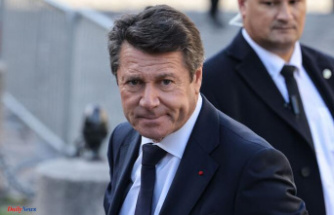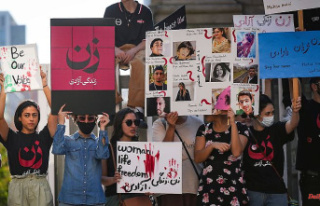In 2016 it was still "tight" in Austria when the Green Alexander Van der Bellen prevailed against the right winger Norbert Hofer in the presidential duel. For re-election on Sunday, he is relying on a proven and controversial strategy - against unconventional competitors.
The President prefers to stay out of it. Of course, Alexander Van der Bellen wants to be re-elected as Austria's head of state this Sunday. But campaign? No, the other candidates should fight it out among themselves.
At the last round of elephants before the election on Thursday evening on ORF, Van der Bellen showed up, but only for a one-on-one interview. The incumbent rejected a direct duel with his opponents. German voters know this strategy as "asymmetric demobilization," or more simply: Merkel's election campaign. no content, no confrontation, no emotions. On election day, the lulled swing voters stay at home, the regular clientele ensures victory, thank you, let's continue.
In his closing statement, Van der Bellen even recycled the legendary Merkel slogan from the 2017 German election campaign: "You know me." A plagiarism that should pay off for Alexander Van der Bellen: polls predict 51 to 58 percent of the votes, enough for a win in the first round. However, that would not be a convincing success. Van der Bellen's predecessor Heinz Fischer was confirmed in 2010 with almost 80 percent, traditionally, thanks to the office bonus, re-election was a "gmahde Wiesn". Not so this year. Even a quick win would not be a sedative for political Vienna, which after Ibiza and Corona has to deal with the next crisis with inflation. It's rumbling in Austria - and the President is not entirely innocent.
Van der Bellen's campaign team should have noted the duel boycott with relief, the president's penchant for thoughtless sayings and gestures is notorious. During the 2016 election campaign, he got carried away with a windshield wiper when he appeared with FPÖ right-winger Norbert Hofer. This year, the solo performances were sometimes very unfortunate - asked in an interview about his advice to young people in times of inflation, Van der Bellen said: "Gritt your teeth. It'll work out somehow." A typical Van der Bellen, the image of a distracted professor is not wrong for the 78-year-old. The saying does not testify to political instinct: At 10.5 percent, inflation has reached its highest level since 1952, the head of the economic research institute Wifo, Gabriel Felbermayr, warns of a recession. In a market study, only 18 percent of those surveyed are optimistic about the future.
Van der Bellen should recognize the signs of the times. In the summer, few but loud demonstrators followed him everywhere, and he was even accompanied by whistles at the Salzburg Festival. The protests arose in the vicinity of corona deniers and opponents of vaccination, who are now working towards a change of topic and a "winter of rage" that should be discharged on the streets as soon as the first people can no longer pay their gas bills.
The FPÖ, firmly established in parliament and yet an eternal protest party, is climbing noticeably in the polls. The potential for frustration among the electorate is so great that several candidates want to draw on it on Sunday: Six men are opposing Van der Bellen, more opponents than ever before, with four of them fishing in the right-wing camp.
Van der Bellen justified the fact that he refused direct confrontation with his challengers with the "dignity of the office", which must not be damaged in the election campaign. When the competition finally met on the big stage for the first time in mid-September, the argument could hardly be dismissed out of hand. The "Standard" afterwards moaned about a "bizarre-seeming group of men" - with one exception: "The most serious of all was the candidate of the beer party."
In fact, for weeks you have been able to observe the candidates, sometimes more, sometimes less behaviorally conspicuous, padding across the big stage. The boss of the beer party, known as the punk singer "Marco Pogo", is trying to change his image, appears under the real name Dominik Wlazny and the motto "Red ma' drüber" - and is considered a kind of left-wing opposition to Van der Bellen. But when a TV presenter wanted to talk to him about his exact plans, he only stuttered out a rather stale answer.
The eco-entrepreneur Heinrich Staudinger, known for his Waldviertel shoes, a favorite brand of the green-alternative middle class, shot himself completely out of the race. He ranted in front of cameras that the "MeToo" movement was being controlled by the CIA to "make coalitions between people more difficult".
From the right, Van der Bellen faces a quartet that covers all conceivable positions on the right-wing fringe: Walter Rosenkranz, a fraternity member who denies climate change, is standing for the FPÖ. The lawyer Michael Brunner is a corona denier who speaks of “thousands of vaccine deaths”. The bourgeois-looking Tassilo Wallentin, columnist in the powerful "Kronen-Zeitung", would like to lead Austria out of the EU. Gerald Grosz, social media riot noodle and Jörg Haider ultra, has meanwhile committed by notarial deed to immediately dismiss the government as president without further talks. Apart from his motto "Make Austria Grosz again", he made headlines with a memorable Twitter video in which he sings the beer tent hit "Zipfl eini, Zipfl aussi".
Even if the right-wing candidates take each other's votes - together they come up to 35 percent in polls, a potential that the top dogs from the FPÖ will register benevolently with regard to the next parliamentary elections.
In his second term of office, Van der Bellen could then face a similar situation as in 2017: At that time, the Greens, who had promised during the election campaign not to swear in a right-wing extremist government, had to swear in the Strache fraternity just as much as the tough ideologue Herbert Kickl, who from then on when the interior minister turned the protection of the constitution and the police to the right. If you look at the videos from back then, you will find comments from disappointed voters: We didn't give Van der Bellen our vote for that.
The man, who was celebrated as the "Öbama" bulwark against the right after his victory against Norbert Hofer, had to watch from the Hofburg as Sebastian Kurz and Strache orbanized the country step by step. If he didn't want to trigger a medium-sized national crisis, the president had no choice but to make gentle objections in Sunday speeches.
When Strache did it himself in the vodka bull frenzy in Ibiza, Van der Bellen distributed valerian to the people: "We're not like that," he said in a now famous speech. Quiet words, dachshund look, that's how the Austrians know their president. During the turbulent years of his tenure, almost 70 new members of the government made the pilgrimage to the Maria Theresa Hall with the red velvet wallpaper to pick up their certificates of appointment. Christian Kern, Sebastian Kurz, Brigitte Bierlein, Sebastian Kurz again, Alexander Schallenberg, Karl Nehammer - Chancellors came and went, Alexander Van der Bellen greeted them all with the same grandfatherly composure, mostly forgetting an important protocol point to the general amusement. A clumsy professor who gently guides the people through troubled times - that was his role.
Critics complain that he shouldn't have calmed down after Ibiza, but should have given the next government a clear mandate to repair the non-transparent party financing in order to tackle the corruption problem. They would have wished for a louder president when Sebastian Kurz and his turquoise ÖVP shot sharply against the judiciary in their political struggle for survival. Just as Van der Bellen promised after his victory in 2016: he wanted to be an "active president", he said at the time. If things continue like this, it may well be that he will have enough opportunity to keep this promise in his second term.












